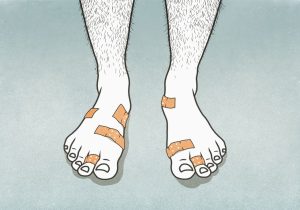Congratulations! Now that you’ve done all the hard work, including the months of training, and completed a marathon, it’s time to give yourself a little TLC. It’s also an important part of the marathon journey, because what you do – and don’t do – after you cross the finish line determines how quickly you’ll travel the road to recovery.
What should runners do after finishing a marathon?
Here’s exactly what to do after crossing the finish line to help your legs recover faster, plus, how long you should wait before you think about running again.
At the finish line
Try to keep moving for 10-15 minutes.
Avoid static stretching. The soreness you feel is down to a lot of muscle damage, static stretching could make this damage worse.
Within an hour of finishing a marathon
Try to eat a carb-rich snack or drink. Your main goal after running 26.2 is eating like an athlete. To start with, make sure you replace the carbohydrates you’ve used up. Within the next 1-2 hours, try and eat a balanced meal of carbs, vegetables and protein.
Make sure you keep hydrated, and keep an eye on the colour of your urine over the next 24 hours – it should be a light yellow or clear.
Avoid lingering in damp, sweaty kit. Get into clean layers as soon as you can.
In the afternoon
Try having a nap for up to 90 minutes – this is the optimum time to experience the beneficial REM sleep. Sleep is key when it comes to muscle repair, so rather than heading straight to the pub, have a nap – your body will thank you.
Avoid anti-inflammatory painkillers such as ibuprofen (Nurofen). These should be avoided for several days after the marathon as they can damage your liver. If you are in pain, paracetamol is fine.
Later that evening
Try a milk-based drink before you go to bed. The carbohydrates and proteins in milk can help aid recovery.
Avoid excessive alcohol. A celebratory beer is fine, but avoid turning things into a big celebration, as excessive alcohol can dehydrate your body further, slowing down recovery.
The next day
Try wearing compression socks or tights as much as possible. Studies have shown they can help boost recovery.
Avoid people with colds and infections. The amount of stress you’ve put your body under means your immune system is compromised, making you more susceptible to a post-race cold.
2 days later
Try a gentle swim. Active recovery is better than sitting on the sofa. A study in the International Journal of Sports Medicine revealed that a swimming-based recovery session enhanced exercise performance the following day when compared to passive recovery, so a few easy lengths in the pool could see you mastering those DOMS.
Avoid running just yet.
3-4 days later:
Try a sports massage. Whilst it’s tempting to say yes to the sports massage that might be laid on for you in the post-marathon celebrations, just like static stretching, this could make things worse. Book one in for 3-4 days later.
Avoid ice baths. If you’re going to have an ice bath, make sure it’s almost immediately after the race. In the days after, opt for a warmer bath. Olympian Jo Pavey explains: “Hot baths promote blood flow to the muscles by dilating blood vessels – this is not what you want immediately after exercise. However, in the days that follow, when any acute pain has receded, a hot bath is best to help increase circulation, which aids healing.”
5-6 days later:
Try a ‘test’ run of 20-30 minutes, observing any enduring aches or pains.
Avoid speedwork/hills, or any performance goal. You’re well on the way but you’re not there yet.
When can you run again after the marathon?
Unfortunately, there’s not one specific answer here, and it really depends on how you ran and how you feel. Some experts recommend one day of rest for every mile raced, or 26 days of rest; and some even recommend one day of rest for each kilometer raced, or 42 days of rest! Remember, running a race at a sub-maximal effort is different than racing it. But the reality is that there is no exact formula to follow for recovery after a marathon, so the best guide is really tuning in and listening to your body.
I feel fine after running a marathon. Do I really need to take a recovery break?
In a word, yes. “While you may feel ready to go, your muscles, tendons and soft tissue are not,” says online running coach Christopher Dean. “Jumping straight back into your running routine will only increase your risk of injury.” Burn off your excess energy with one or two weeks of light cross-training. Swim, cycle, use the elliptical or do other low-impact activities every other day for the same amount of time you would otherwise spend running. If you experience any soreness, minor aches or fatigue, take a few days off and rest.




